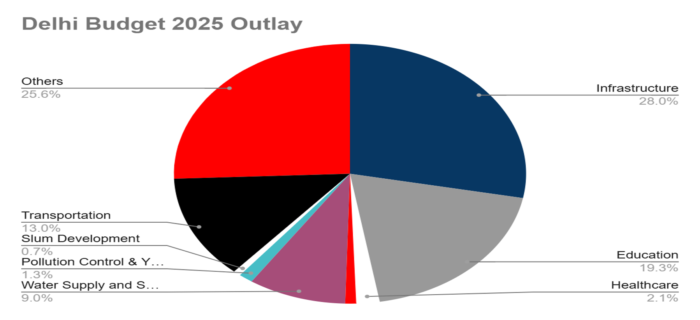Delhi Budget 2025 Increased by 31.5%—MSMEs Can Contribute to the ₹1 Lakh Crore Vision
- The Budget focuses on 10 key areas, including infrastructure, education, healthcare, clean water, and urban development
- From smart classrooms and eco-solutions to mobility and diagnostics, MSMEs can tap into government spending across sectors.
- Tailored loan products can enable small businesses to scale operations & contribute to inclusive growth
The Delhi Government presented its budget 2025 for inclusive and future-forward growth. This budget focuses on 10 key areas: infrastructure, healthcare, education, clean water, and women’s empowerment. With a 31.5% increase in the overall budget from the previous year, it aims to modernize Delhi, enhance quality of life, and foster economic growth.
Here’s the budget at a glance:

The highlights from the ₹1 lakh crore budget for 2025-26 include:
- Infrastructure: Capital expenditure doubled to ₹28,000 crore to accelerate infrastructure projects.
- Healthcare: ₹2,144 crore earmarked for the Pradhan Mantri Jan Arogya Yojana.
- Clean Water & Sanitation: ₹9,000 crore allocated to improve drinking water and sanitation facilities.
- Transport: ₹12,952 crore dedicated to enhancing transportation, including ₹1,000 crore for Delhi-NCR connectivity.
- Education: New “CM Shri Schools” to be opened with ₹100 crore allocated and ₹750 crore set aside for free laptops for students passing Class X.
- Pollution Control: ₹300 crore for pollution control measures, along with ₹506 crore for the Environment & Forest Department.
- Yamuna Cleaning: ₹500 crore for cleaning the Yamuna River through decentralized sewage treatment plants.
- Social Security: 50,000+ CCTV cameras to be installed across the city
- Slum & Urban Development: ₹696 crore to enhance basic facilities for slum development.
- Tourism, Art, & Culture: ₹139 crore for various related schemes
While these allocations make way for a smarter, greener, and more equitable urban experience, MSMEs also find themselves at the core of this transformation. Small businesses have a massive opportunity to plug into the government’s vision as they can provide products and services in each sector:
| Sector | Domain | MSME Products/Services Opportunities |
| Education | E-learning, Skill Development, Vocational Training | Educational institutions Content creation (digital, print)Online tutoring platformsEducational toys and gamesSpecialized software/apps Training and upskilling programs for teachers |
| Environment & Cleantech | Renewable Energy, Waste Management, Pollution Control | Solar panels and componentsWaste recycling and processing unitsProduction of biodegradable productsAir and water purification systemsConsultancy for environmental complianceDeveloping and manufacturing EV components |
| Healthcare | Medical Devices, Pharmaceuticals, Healthcare Services | Medical equipment and devicesPharmaceuticalsDiagnostic centers and labsHome healthcare servicesTelemedicine solutionsAssistive technology products |
| Transportation | Logistics, Automotive, Public Transport | Auto componentsLogistics and supply chain servicesElectric vehicle charging infrastructureDeveloping traffic management systemsProviding last-mile connectivity solutionsDeveloping EV components |
| Infrastructure & Urban Development | Construction, Real Estate, Urban Planning | Construction materialsArchitectural and engineering servicesDeveloping affordable housing solutionsSmart city solutions (IoT applications)Waste management & sanitation systemsLandscaping and urban greening services |
As the budget creates a value chain of opportunities where small enterprises can become growth enablers, financing this growth can empower them to launch or expand operations, invest in scalable outputs, and meet rising B2G (business-to-government) demand efficiently in the following ways:
1. Educational Infrastructure
The education sector has the largest share in Delhi’s Budget 2025. Apart from providing free laptops to students in government schools, an additional ₹100 crore has been earmarked to develop smart classrooms for grades 9 to 12, targeting 7,000 classrooms in phases. The systemic push toward digital classrooms will include addition of smartboards, projectors, computer labs, trained personnel, and consistent IT support.
MSMEs can establish themselves as long-term implementation partners through education institution loans by participating in large-scale education tenders or PPP (public-private partnership) opportunities without capital becoming a bottleneck.
2. Environment & Cleantech
The strong emphasis on sustainable development, pollution control, Yamuna River cleaning, and integrated waste management creates a robust opportunity for cleantech MSMEs offering scalable solutions in waste segregation, air and water purification, and eco-friendly manufacturing.
With Loan Against Property and Equipment & Machinery Loan, firms providing equipment for composting, sewage treatment, or recycling can directly participate in public procurement projects or supply to civic contractors
3. Healthcare
The Delhi government’s investments in mohalla clinics, government hospitals, and diagnostics infrastructure present a growth opportunity for MSMEs operating in diagnostics, telemedicine, medical equipment supply, and healthcare staffing.
Access to credit through business loans enables healthcare MSMEs to meet operational needs, serve wider regions, and align with Delhi’s push for equitable and decentralized health access.
4. Transportation
The government is aiming for large-scale improvements in transportation infrastructure like road connectivity, electric bus fleets, and last-mile transport solutions, traffic congestion, and intra-city logistics. MSMEs like small transporters, EV retrofitters, and fleet solution providers can support the shift to electric and efficient transit systems through Equipment & Machinery Loans and Business Loans.
5. Infrastructure & Urban Development
Delhi’s infrastructure outlay includes road repair, flyover construction, public utility upgrades, and urban beautification projects. The NCR still sees delayed projects due to mid-sized contractors’ limited capacity and service providers’ capacity to scale rapidly—especially across civic bodies like the Delhi Development Authority (DDA), New Delhi Municipal Council (NDMC), and local municipal zones.
With funding solutions such as business loans and Loan Against Property, civil contractors, raw material suppliers, EPC firms, and service vendors can contribute to this capital spending.
6. Miscellaneous Services: Public Safety and Surveillance
As part of its commitment to women’s safety and urban security, the Delhi Budget also outlines funding for additional CCTV installations and smart surveillance systems across public areas and transportation hubs.
MSMEs in surveillance hardware, software integration, and security services can step in as solution providers by leveraging Business Loans and Equipment & Machinery Loans.
A Budget of Possibilities—Financed by Foresight
By aligning with policy priorities and accessing timely credit, local MSMEs in Delhi-NCR region can play a pivotal role in education reform, clean technology, healthcare, urban development, and public safety. The ability to scale up, deliver efficiently, and plug into government initiatives hinges on access to capital.

